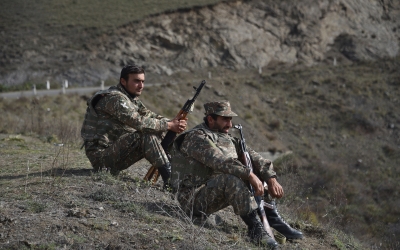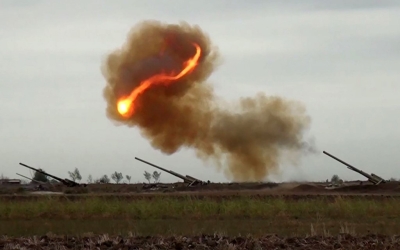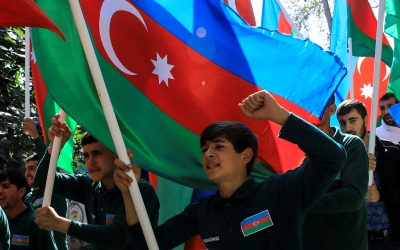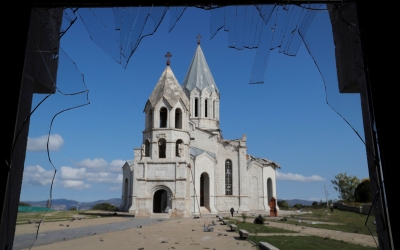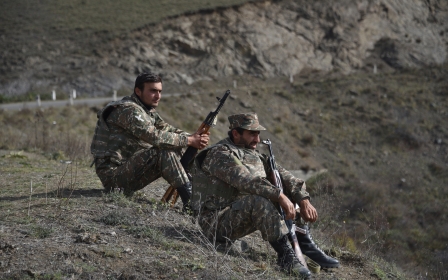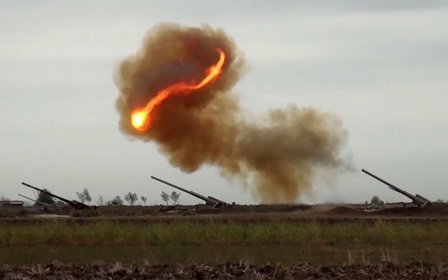'They are scared': Armenians flee Istanbul amid anger over Nagorno-Karabakh
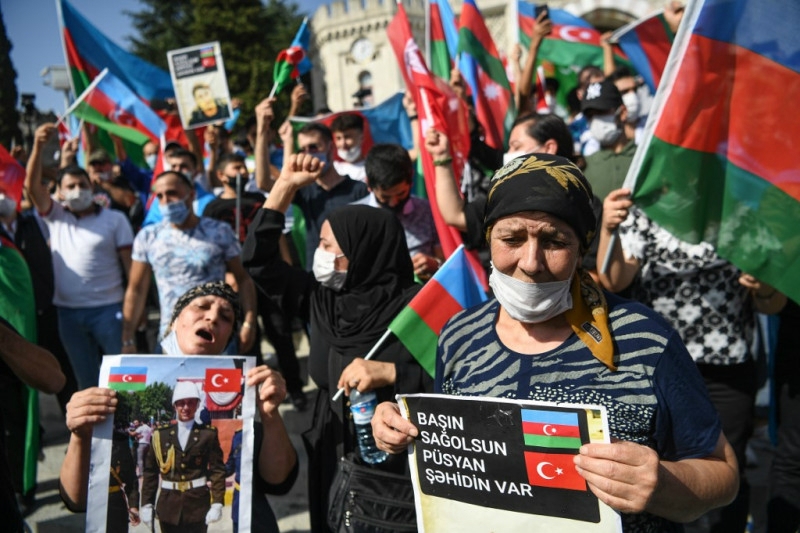
Hundreds of Armenians who have made Istanbul their home have been desperately seeking ways to return to their native land following the outbreak of the Nagorno-Karabakh conflict in September.
Azerbaijan, with strong backing from Turkey, with which it has close ethnic ties, has for weeks been fighting a fierce war with Armenian forces in the disputed mountainous territory.
An Armenian administration has run Nagorno-Karabakh, which is recognised by UN resolutions as part of Azerbaijan, since 1994. As a result, despite being neighbouring countries, the border between Turkey and Armenia has been closed since 1993.
On Tuesday, Armenia, Azerbaijan and Russia announced that they had signed a deal to end the latest fighting in which thousands are feared dead.
Since the conflict began around six weeks ago, anger and protests have broken out in Turkey directed at Armenians in general and in particular the Armenian community of Istanbul.
As they search for ways to leave, Armenian citizens living among Istanbul’s small ethnic Armenian community have turned to an underground network established by word-of-mouth and social media to spirit them out of Turkey.
At a bus station in Fatih, one of Istanbul’s oldest neighbourhoods, squeezed between the Bosphorus and Golden Horn waterways and the city’s ancient Theodosian walls, an Armenian flag is painted at the entrance, among other nation’s colours - a rare sight in Turkey even before the current tensions.
Almost all travel agency offices and ticket desks were closed when Middle East Eye visited the station and a private security guard sat dozing.
In front of the only travel agency open for business three men sitting out front denied the existence of any bus service to Armenia.
“Everything is shut down,” one man in his mid-40s told MEE. “We only run a daily bus to Georgia and we don’t even enter Georgia. We carry Georgians and drop them at the border.”
However, sources claimed that buses regularly leave from the area.
'We live in harmony'
Sounding stressed and even scared, Dalita*, 49, who could be seen waiting around the station, said that she was indeed planning to make the 30-hour journey.
“They told us 8pm but now they say ‘Wait for our phone call’. My luggage is ready and I am waiting,” she told MEE.
With no sign of any passengers arriving long after the purported 8pm departure, machine-gun-toting police officers guarding the nearby Armenian Patriarchate, the headquarters of Armenian Christianity in Turkey, seemed relaxed.
At a cafe–restaurant a few blocks away, said to be run by two Armenian citizens and a regular hang-out for Armenians, a "For Rent" sign hung in the front window. Calls to the number on the sign went unanswered.
“They suddenly moved out a few months ago,” said Cemal*, 52, the owner of a small textile business next door.
“Their business was good normally. Maybe it is due to Covid. I don’t think this move was related to the Armenian-Azerbaijani conflict, but again who knows.
“I have been in this neighborhood for more than 30 years. The demonstrations [against Armenians] were done by people who came from other places.
"There are people from every nation and religion here. We live in harmony.”
'They are not my citizens'
Armenia and much of the international community have described the killing of ethnic Armenians at the hands of Ottoman forces during World War I as a genocide.
Turkey acknowledges that atrocities took place against the community during the war, but it says the killings were not a part of a systematic campaign and do not amount to genocide.
The numbers of ethnic Armenians in Turkey has continued to dwindle since World War I. The community now numbers less than 100,000, most living in Istanbul.
However, the presence of a significant number of Armenian nationals living alongside their ethnic kin was something not well-known until Recep Tayyip Erdogan, then Turkey’s prime minister and now president, referred to them in comments made ten years ago.
“There are 170,000 Armenians in my country, 70,000 are my citizens,” he told the BBC during a trip to the UK.
“We are keeping an eye closed to the 100,000 for now. So what will I do tomorrow? If necessary, I will tell those 100,000 ‘Go to your home!’. I will do that.
"Why? They are not my citizens... I have no obligation to keep them in my country.”
Such statements caused understandable concern among Armenian citizens in Turkey at the time.
Many were worried about the possibility of deportation after years of living in the country alongside a mix of Russians, Ukrainians, Georgians and Turkmens who arrived after the collapse of the Soviet Union, as well as more recent arrivals from Africa and war-torn Iraq.
However, as the years passed, such fears faded and large numbers of Syrians, Afghans and Uzbeks joined Fatih’s multinational mix.
'One nation, two states'
However, with the flare-up of fighting in Nagorno-Karabach in September, the community once again found itself the centre of attention.
Suddenly, the age-old phrase “One nation, two states” - used to describe Turkey’s relationship with its fellow Turkic ally Azerbaijan - was on the lips of nearly every Turk.
This support and solidarity was shown through all levels of society.
Demonstrations and rallies were held around the country, Azerbaijani flags were hung in prominent places, while the iconic Galata Tower in Istanbul and the Atakule Tower, a symbol of the capital Ankara, were lit in the colours of Azerbaijan.
Yet, at some point, these sincere shows of solidarity started to worry even Turks when protestors focused on Istanbul’s historic Armenian neighbourhoods, including the street of the Armenian Patriarchate, blaring nationalistic songs from their cars and shouting intimidating slogans.
'Very vulgar and threatening'
Some ethnic Armenians, whose ancestors had lived in Istanbul for as long as centuries, were bemused by the turn in events.
“We are Turkish citizens. We have nothing to do with Armenia, we have no ties other than our ethnicity,” Eva*, 61, said, as she sipped herbal tea at a traditional coffee house in Istanbul.
“Of course we have contact with the Armenian citizens here but they are closer to Russians. Our culture is different. They prefer to hang out more with Russians.”
Russia, traditionally seen as an ally of Armenia, has a defence pact with Yerevan and a military base in the country.
“I was born and raised here. I am a Turk. My family has been here for centuries," said Eva.
"One day protestors came here and shouted slogans. Some were very vulgar and threatening. I have never witnessed any threat in my life but even I was scared.
“Of course the Armenian citizens got afraid. There were many Azerbaijanis among the crowd.
"I am angry. If you love your country so much, go and fight. Why do you bring your problems to my backyard?”
'Just being manipulated'
The tense atmosphere led many Armenian citizens to consider leaving the city that had provided them with a home and work for many years.
On the same night MEE visited the Fatih bus station, Nurhan Cetinkaya, 52, a prominent politician from the Turkish Armenian community, tweeted that up to 500 Armenian citizens were to leave Turkey that night due to fear of retribution.
“I am in contact with several of those that will leave tonight,” he told MEE.
'Today, it is Armenians. Tomorrow it could be Greeks, Georgians, even some segments of Turkish society itself'
- Nurhan Cetinkaya, Turkish-Armenian politician
“They are scared. What do you expect? People and the youth are bombarded with propaganda by nationalist TV series.”
“The news coverage of the conflict, the language politicians are using is terrifying.
"Today, it is Armenians. Tomorrow it could be Greeks, Georgians, even some segments of Turkish society itself.
“We experienced the 6-7 September pogrom of Istanbul in 1955," continued Cetinkaya, referencing a series of organised mob attacks aimed mainly at the city's Greek minority.
"I am sure that most of the people, especially the young ones during the recent anti-Armenian demonstrations, would share their bread with Armenians; they would host me in their homes and I would host them.
“They are just being manipulated. This is the saddest part.”
'Humanitarian corridor'
Many Turkish Twitter users expressed solidarity after Cetinkaya’s tweet.
Fatma Ceren Yazgan, Turkey’s ambassador to Georgia, replied that some 400 Armenian citizens had returned to their country between March and July, even before the start of the Nagorno-Karabakh fighting.
A senior official responsible for refugees and foreign nationals at Turkey’s Ministry of Interior confirmed the voluntary departure of Armenian citizens from Turkey.
“We are responsible for the well-being of everyone in this country and we take necessary steps in that direction,” the official said.
With the border between Turkey and Armenia closed, many returning Armenians have had to pass through Georgia in order to get home.
George Janjgava, Georgia’s ambassador to Ankara, told MEE that “thousands of Armenian citizens are using our land to go to other countries”.
“Ninety-nine percent of Armenians entering Turkey do so via Georgia. Georgia is a neighbour of Turkey and Armenia. Armenia is using our border. It was, it is and it will be.”
“For us it is a normal, everyday issue. This is a human step from us and you [Turkey]. This humanitarian corridor is normal to me.”
A senior source at the Turkish Ministry of Foreign Affairs noted that “this is an arrangement of Georgian and Armenian authorities”.
Difficult journey
The path from Turkey to Armenia is not an easy or simple route.
Ani*, 43, a housemaid who has been living and working illegally in Turkey for more than 12 years, told MEE that there were problems passing through Georgia.
“Georgia did not accept us. So we tried to go via Iran. That didn’t work out either,” she said.
“Now my sister from Russia is going to send me an invitation for a visa, but it is expensive to travel there.
“Normally, I don’t want to go. I am here for so many years. Nobody is bothering me personally but now I am even afraid to make phone calls to Armenia.”
Referring to the secretive bus trip from Fatih, she said: “Two hundred people are on the list to leave on the planned trip today.
"This is organized on a Facebook group. You apply there to leave. It is organised by an Armenian citizen named G.”
When contacted by MEE, G refused to comment beyond denying any involvement and saying that he had only heard rumours that Armenian citizens could leave via Belarus.
Coronavirus precautions
In an official statement to MEE, the Georgian Ministry of Foreign Affairs said the process of transferral of Armenian citizens from Turkey to their homeland started in spring 2020, after the temporary closure of state borders between Georgia and Turkey, as well as Georgia and Armenia, due to the threat of pandemic spread.
“Taking into account the humanitarian aspect of the problem, the government of Georgia made a decision to facilitate the limited movement of foreign citizens throughout the territory of Georgia with special restrictions.
“In particular, groups of people/transit passengers travelling with buses or cars through Georgia have been escorted by Georgia’s traffic police from the check-point at the Georgia-Turkey state border, to a checkpoint at the Georgia-Armenia state border, and vice versa, with stopovers at specially equipped rest areas without allowing any contact with the general public."
When asked about the numbers of people travelling in both directions by MEE, the ministry responded: “All movements have been coordinated via diplomatic channels. We had a couple of hundred passengers travelling from Turkey to Armenia and a couple of dozen persons from Armenia to Turkey.”
Anna Naghdalyan, a spokesperson for the Armenian Ministry of Foreign Affairs, told MEE: “Since the first days of the Covid-19 lockdowns we have been engaged in organising the return of our citizens from Turkey based on their own initiative.
"We were involved in the elaboration of logistics and organizing transport for their transfer via Georgia.
The spokesperson added that about a couple of hundred Armenian citizens had returned to Armenia with consular assistance. "The Armenian government worries about the well-being of all our citizens in any corner of the world.”
People are afraid
Yetvart Danzikyan, 51, editor in chief of the Turkish Armenian daily Agos, told MEE that economic reasons were also behind the flight of Armenian citizens from Turkey.
“The reasons that Armenian citizens are leaving Turkey are not only the war in Karabakh,” he said.
“Economically they suffer here. The increase in [the value of the] dollar [against the Turkish lira], plus the Karabakh issue.
"Not all want to leave. The existence of Armenian citizens in Turkey is a richness. It is very sad to witness the loss of that.
'The existence of Armenian citizens in Turkey is a richness. It is very sad to witness the loss of that'
- Yetvart Danzikyan, editor of Turkish Armenian daily Agos
“I can’t say anything in particular or give numbers but I hear more Armenian citizens are going to leave soon.”
Speaking with a softness close to a whisper, Armenian citizen Lala, 64, outlined her personal circumstances.
“I have been here for 25 years,” she told MEE. “I have a grandson who started university this year whom I’ve never seen. I probably could hardly find my home when I go back.
“No Turk has ever done me any wrong, but I am afraid. I saw the demonstrations and they scared me.
"I will wait a little more. Some people say this will be over soon. I hope so. I am working from home now. My boss sent me a sewing machine.
“I don’t want to leave. I raised my two children and grandson with the money I earned here. The only thing I can do is to pray for peace.
"Why is all this happening? I can’t understand. We are all the same...”
*Names have been changed to protect the identity of the speakers
Middle East Eye delivers independent and unrivalled coverage and analysis of the Middle East, North Africa and beyond. To learn more about republishing this content and the associated fees, please fill out this form. More about MEE can be found here.


